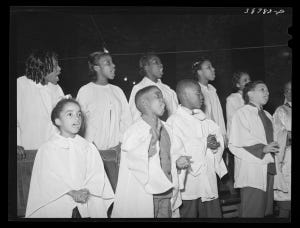Amplifying Subjugated Knowledge in "Mahogany and Steepled Towers"
Evangelicalism in the United States has significantly influenced political discourse, pulling it sharply to the right. In response, marginalized communities worldwide, including African-descended women, have been redefining God and faith from their unique vantage points. This redefinition embodies what philosopher Michel Foucault termed "subjugated knowledge"—ways of knowing that have been suppressed or invalidated by dominant systems of power.
Toni Morrison’s words, "I stood right on the margin and declared it center. Let the world come to me!" resonate deeply with this movement, inviting us to reimagine center-margin dynamics. The latest special issue of the The African Journal of Gender & Religion, "Black Women's Radical Religious Epistemologies in Mahogany and Steepled Towers," takes up this challenge, spotlighting transformative scholarship and lived experiences that reframe traditional theological narratives.
A Platform for Marginalized Voices
This groundbreaking issue, edited by Drs. CL Nash, Carol Marie Webster, and Geeta Patel, highlights the diverse religious epistemologies of African-descended women. These contributions challenge conventional theology, emphasizing the profound impact of African heritage on religious practice and thought. With a Pan-African definition of Blackness encompassing individuals with roots in the African continent, the issue brings marginalized perspectives to the forefront, creating a counter-narrative to exclusionary religious scholarship.
Origins and Vision
The special issue is inspired by the Misogynoir to Mishpat (M2M) Research Network, a collective that amplifies the religious knowledge of African-descended women. Historically, academic theology has marginalized Black women, often overlooking their vital contributions. By centering "radical" religious epistemologies, this issue disrupts conventional narratives and reclaims spaces for African-descended women to articulate their spiritual identities.

The metaphorical framing of "Mahogany and Steepled Towers" symbolizes this reclamation. Mahogany reflects African heritage's richness, resilience, and beauty that challenges the current motif of the "ivory tower." Steepled Towers alludes to established religious institutions. Together, they signify the transformative intersection of parish practices and religious scholarship through a combination of tradition and innovation.
Theoretical Framework and Context
Black women’s religious practices are rooted in the resilience forged through legacies of slavery, colonialism, and forced migration. These practices emphasize community strength and spiritual empowerment. Womanist Theology, emerging in the late 20th century, has been instrumental in analyzing these practices through an intersectional lens, incorporating critical race theory and postcolonial perspectives. Yet, despite its growth, significant gaps remain in acknowledging Black women’s religious contributions.
This issue bridges these gaps, offering a roadmap for understanding how African-descended women navigate and reinterpret the Divine through their lived realities. Their scholarship reimagines traditional spaces, creating room for liberation and leadership within theological discourse.
Essays in Focus
The Seminal Role of the Introductory Essay

The introductory essay of this special issue, Black Women’s Radical Religious Epistemologies in Mahogany and Steepled Towers, sets a transformative precedent in religious scholarship. It bridges historical exclusion and contemporary epistemological innovation, articulating a groundbreaking expansion of the “Ivory Tower” into the “Mahogany Tower.” While the “Ivory Tower” traditionally symbolizes an elite, often exclusionary domain of academia, the “Mahogany Tower” embodies inclusivity, resilience, and the profound contributions of Black women to both religious scholarship and parish leadership.
This essay is seminal in that it explicitly redefines academic and theological spaces by foregrounding radical, marginalized knowledge systems as central to understanding global religious traditions. It invites readers into an intellectual and spiritual dialogue that not only disrupts established paradigms but also paves the way for reimagining religious praxis and epistemology. By weaving together theoretical insights, historical context, and a vision for the future, the introductory essay anchors this issue as a landmark contribution to Pan-African and global religious studies.
The introductory essay not only sets the stage for the special issue but also frames the broader intellectual endeavor as one that challenges entrenched boundaries in religious scholarship. By re-centering marginalized voices, it underscores the transformative potential of Black women’s religious epistemologies to reshape theological discourses and community practices. This foundational essay makes clear that the radical is not merely disruptive but also generative, offering new pathways for understanding faith, identity, and liberation.
The contributions to this issue traverse geographies and traditions, offering fresh perspectives on Black women’s religious knowledge. From the rich spiritual practices of Nigeria and Jamaica to the intersection of anti-colonial politics and religion in Senegal, Sudan, and South Africa, these essays illuminate the dynamic interplay between African heritage and contemporary challenges. Here is a brief summary of each contribution:
"Sufi Islam and Anti-Colonial Politics" by Ameena Al-Rasheed: This essay examines the resilience of Sudanese women in the Diaspora, exploring how Sufi practices in West Yorkshire, UK, sustain cultural identity amid dominant Islamic narratives.
"Ọbịa by Igbo Spelling: Affirming the Value of After God is Dibịa" by Claudette Anderson: Anderson reclaims the spiritual practice of Ọbịa, challenging colonial erasure and repositioning it as a vital source of healing and wisdom.
"Empowered Resistance: The Impact of an African Indigenous Faith on the 'Woman Who Was More Than a Man'" by Shandon C. Klein: This piece delves into the life of Aline Sitoë Diatta, whose religious beliefs fueled anti-colonial resistance in Senegal.
"On/Unstained White Dress(es)…: Afro-Caribbean Female Purity in Sacred Spaces in Three Caribbean Women Poets" by Anna Kasafi Perkins: Perkins explores how Afro-Caribbean poetry uses the white dress to interrogate themes of purity, gender, and race.
"Doing Church Differently: Crafting a Church Using the Circle’s Theologizing Methodologies in a Xenophobic and Gendered Context" by Clementine Nishimwe: Nishimwe examines how African women theologians address xenophobia and gender discrimination within South African church spaces.
Broader Implications and Future Directions

This issue is a significant intervention in religious scholarship, emphasizing Black women’s resilience and agency in the face of systemic oppression. It demonstrates how marginalized epistemologies can reshape our understanding of theology, faith, and religious identity. The essays collectively invite a rethinking of theological frameworks, urging academia to include more diverse voices and adopt interdisciplinary approaches.
Moving forward, bridging the gap between academic and community practices will be crucial. Engaging directly with African-descended women in their communities can enrich theological studies while fostering policies to address underrepresentation in academic and religious institutions.
A Celebration of Radical Epistemologies
"Black Women's Radical Religious Epistemologies in Mahogany and Steepled Towers" celebrates the transformative power of religion as articulated by African-descended women. This issue stands as a testament to the disruptive, liberating potential of their theological innovations, offering pathways to spiritual and social liberation. By elevating voices once relegated to the margins, it invites the world to reorient its understanding of faith, power, and identity.
Dr. CL Nash, The Misogynoir to Mishpat (M2M) Research Network © 2024




